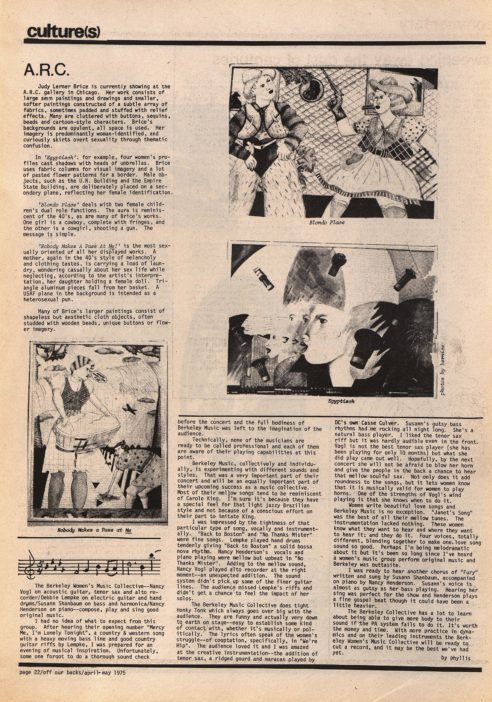This harsher Berkeley Women’s Music Collective concert review challenges the narrative that the women’s music community was judgement free, but it speaks to the level of tolerance that it embodied. The author appreciates the band’s creative instrumentation but concedes that none of the women are ready to be considered professional musicians.
Nancy Vogl had only been playing saxophone for 10 months when this concert took place and that fact speaks for the low pressure environment of women’s music shows.
The review laments that “unfortunately some one forgot to do a thorough sound check before the concert and the full bodiness [sic] of Berkeley Music was left to the imagination of the audience.” However in the next issue of Paid My Dues, the women who did the soundcheck wrote that they spent “three hours checking the sound before the concert” and that they “corrected the problem during intermission by raising the amps on to chairs.”
In the early days of the women’s movement, productions tended to be informal and DIY orientated. Doing something with solely women often meant compromising in terms of quality, simply because of the lack of expertise and opportunity afforded to women at the time.
*
Below Debbie Lempke and Nancy Vogl speak about the band’s audience and preference towards woman-only spaces.
Debbie: We saw ourselves as like, or at least I did, i’ll speak for myself, as supporting our own community, all the workers in the community who were like doing this kind of work. Especially in Berkeley, so we were getting their enthusiasm and the lesbian enthusiasm and not necessarily trying to go out into some regular clubs and do our music. That wouldn’t have worked.
So, who were the audience? I suppose generally it was going to be other people who are feminists, activists, lesbians, and no men. Pretty much, no men. People didn’t want to have any men around. People say “oh it’s so separatist.” Well any political movement, has to have time to get their own group together. Is kind of how we felt about it.
When the black movement was coming to fruition they didn’t want white people running their movement. They wanted to have their own thing and big powerful positions for themselves. So it was that same kind of feeling and like we have to talk about things and not have some guy going, well, what about this? Cause like the feeling was, especially for the activists during the Vietnam war, was that women were, like our opinions weren’t important.
They were still really relegated to getting the coffee and so this was going to be our movement. We haven’t gotten, and I told you about how all this stuff during that generation, how you have to keep quiet, you couldn’t say, you know…this is our turn to speak and we need a hundred percent of the air. I mean, because if you got a group together, nobody could shut up. There was so much energy.
Lily: What was your audience like? Was it people like you?
Nancy: Mostly all the dykes in all the towns. Every touring lesbian musician was the glass of water they were parched for, and at that time you couldn’t get that anywhere. You couldn’t get it on TV, on radio, in magazines, and in the few books, the lesbian nearly always died at the end.
You were invisible within dominant culture, therefore those women-only spaces were the only time that some women could ever experience their full humanity and their expression of who they are/were. At that time, when a man was sitting in the audience, it could literally change the dynamics of an entire room. You could say, well, why did you give up your power? Why did you let that person have so much power? But it’s revisionist history not to understand that none of us had ever experienced that freedom of expression before, and too many women had been traumatized their entire lives by men.
Men were so predominant in our mind and so assumed to be superior, that you could almost not be in a room without having your own humanity bounce off that one man. You’d have a hundred women bouncing their humanity off just this one man and it was not productive for healing.
